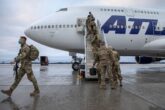April 12, 2010
The Economic Imperative: Stabilizing Afghanistan Through Economic Growth
In this policy brief, CNAS CEO Nate Fick and co-author Clare Lockhart, CEO at the Institute for State Effectiveness, argue that smart execution of the American strategy in Afghanistan depends on tapping into Afghanistan’s economic potential and empowering Afghans to foster economic development in their own country – including bolstering entrepreneurial activity, foreign investment and building infrastructure – and should be pursued simultaneously with the overall counterinsurgency strategy.
The Economic Imperative: Stabilizing Afghanistan through Economic Growth argues that U.S. and ISAF operations in the country currently have an “economic gap,” and, while lack of attention to economic dimensions are numerable and justified, development is an imperative component to sustainable security and must be pursued.
“Harnessing the potential of the Afghan people to succeed on Afghan terms through Afghan institutions will reinforce stability as it spreads from areas cleared of insurgents, will give more Afghans a stake in the future of their country, and provides the only path to national self-sufficiency,” write the authors.
The international community should also help catalyze a number of existing development initiatives that produce tangible benefits quickly for Afghans, including microfinance and public works programs, the National Solidarity Program, and OPIC-offered risk guarantees to potential investors, and:
- Revitalize the role of the World Bank and Asian Development Bank.
- Support the creation of a National Task Force for job development and training.
- Reaffirm the significance of Afghanistan’s economic ministries.
- Create a global task force to identify gaps in strategy, financing mechanisms and to explore and set up additional financial instruments.
More from CNAS
-
A Failure to Plan: Examining the Biden Administration’s Preparation for the Afghanistan Withdrawal
Afghanistan, Iraq, and Vietnam. One failure is a horrible accident; two failures are a tragic coincidence; three failures are a disturbing trend that shows the U.S. government...
By Christopher D. Kolenda
-
Against All Odds
Eighteen months after taking power, the Taliban is intensifying its repression of Afghan civil society and cracking down on the rights and freedoms of all Afghans, especially ...
By Lisa Curtis, Annie Pforzheimer & Jan Mohammad Jahid
-
To Help Afghanistan, Engage Its Political Opposition
The effort to help Afghans shape a better alternative should begin now....
By Richard Fontaine & Lisa Curtis
-
International Community Must Do More to Protect Human Rights in Afghanistan
Human rights in Afghanistan, especially those of women and girls, have deteriorated sharply during the first year of Taliban rule. The very real prospect of losing a generatio...
By Lisa Curtis, Annie Pforzheimer & Jan Mohammad Jahid



